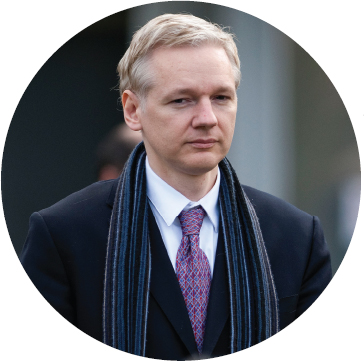Examining Ethics
EXAMINING ETHICS
WikiLeaks, Secret Documents, and Good Journalism?
Since its inception in 2006, the controversial Web site WikiLeaks has released millions of documents—from revelations of toxic dumps in Africa to its 2013 release of 1.5 million U.S. diplomatic records, many involving President Nixon’s secretary of state, Henry Kissinger. WikiLeaks’s main spokesperson and self-identified “editor-in-chief,” Julian Assange, an Australian online activist, has been called everything from a staunch free-speech advocate to a “hi-tech terrorist” (by U.S. Vice President Joe Biden). Certainly, government leaders around the world have faced embarrassment from the site’s many document dumps and secrecy breaches.
In its most controversial move, in 2010 WikiLeaks offered 500,000-plus documents, called the “War Logs,” to three mainstream print outlets—the Guardian in the United Kingdom,the German magazine Der Spiegel, and the New York Times. These documents were mainly U.S. military and state department dispatches and internal memos related to the Afghan and Iraq wars—what Bill Keller, then executive editor of the New York Times, called a “huge breach of secrecy” for those running the wars. Keller described working with WikiLeaks as an adventure that “combined the cloak-and-dagger intrigue of handling a vast secret archive with the more mundane feat of sorting, searching and understanding a mountain of data.”1 Indeed, one of the first major stories the Times wrote, based on the War Logs project, reported on “Pakistan’s ambiguous role as an American ally.”2 Then just a few months later, Osama bin Laden was found hiding in the middle of a Pakistani suburb.
WikiLeaks presents a number of ethical dilemmas and concerns for journalists and citizens. News critic and journalism professor Jay Rosen has called WikiLeaks “the world’s first stateless news organization.”3 But is WikiLeaks actually doing journalism—and therefore entitled to First Amendment protections? Or is it merely an important “news source, news provider, content host, [or] whistle-blower,” exposing things that governments would rather keep secret?4 And should any document or material obtained by WikiLeaks be released for public scrutiny, or should some kinds of documents and materials be withheld?

Examining Ethics Activity
As a class or in smaller groups, consider the ethical concerns laid out above. Following the ethical template outlined in Chapter 1, begin by researching the topic, finding as much information and analysis as possible. Read Bill Keller’s New York Times Magazine piece or his longer 2011 Times report, “Open Secrets: WikiLeaks, War and American Diplomacy” (www.nytimes.com/opensecrets). See also Nikki Usher’s work for Harvard’s Nieman Journalism Lab and Jay Rosen’s blog, PressThink. Consider also journalism criticism and news study sites such as the Columbia Journalism Review, the Pew Research Center, and the First Amendment Center. Watch Julian Assange’s interview on CBS’s 60 Minutes from January 2011.
Next, based on your research and informed analysis, decide whether WikiLeaks is a legitimate form of journalism and whether there should be newsroom policies that restrict the release of some kinds of documents for a news organization in partnership with a resource like WikiLeaks (such as the “War Logs” project described above). Create an outline for such policies. 
“In media history up to now, the press is free to report on what the powerful wish to keep secret because the laws of a given nation protect it. But Wikileaks is able to report on what the powerful wish to keep secret because the logic of the Internet permits it. … Just as the Internet has no terrestrial address or central office, neither does Wikileaks.”
–Jay Rosen, PressThink, 2010